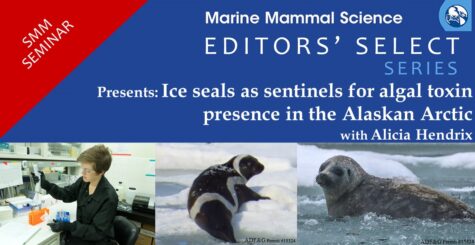
The SMM Seminar Editor’s Select Series highlights the latest and most exciting marine mammal science published in the Marine Mammal Science Journal. The SMM created this series to give scientists and citizens around the world a chance to engage with marine mammal scientists, learn and ask questions. All are welcome.
Thursday, 17 February 2022 at 7 PM EST (4 PM PST / 12 AM UTC)
SMM Seminar Editors’ Select Series: Ice seals as sentinels for algal toxin presence in the Alaskan Arctic
This event is free to attend and presented online on Zoom, but registration required.
Register here: https://us06web.zoom.us/webinar/register/WN_j-IwEcQQRAGoRFv8mpZIoA
Space on Zoom is limited to the first 500 attendees. The talk will also be streamed live on the SMM Facebook page.
About this talk:
The algal-produced neurotoxins domoic acid and saxitoxin permeate food webs in the Alaskan Arctic and subarctic, potentially threatening the health of high-level consumers. As water temperatures continue to rise in the Arctic due to climate change, marine mammal exposures to these toxins may be increasing as warmer ocean temperatures are more favorable for toxic algal blooms. We analyzed domoic acid and saxitoxin presence and levels in samples from the gastrointestinal tracts of almost one thousand Alaskan ice seals harvested over fifteen years for subsistence purposes. Though no clinical signs of health impacts were reported in harvested seals, one or both toxins were found in all four species studied. Additionally, the number of ice seal stomach content samples containing DA increased over time in seals collected in the Bering Sea, suggesting an increase in toxin prevalence in the region. Increasing toxin exposure in ecologically and culturally critical Alaskan species, including ice seals, raises concerns for potential health impacts if toxins continue to increase in the future.
About the presenter:
Alicia Hendrix is a PhD student in the University of Washington’s Environmental Toxicology program. She has a Bachelor’s degree in Biology from Scripps College. Her work has taken her throughout the Americas, studying threats to marine ecosystems as diverse as the Pacific intertidal and the Mesoamerican Barrier Reef with organizations including the Cape Eleuthera Institute and the NOAA Fisheries. Her research interests include toxin and toxicant impacts on wildlife and human health, and methods for promoting ecosystem resilience in the face of new threats. She has mentored or taught students at elementary, high school, and undergraduate levels, and believes strongly in building partnerships with coastal communities to amplify regional voices and knowledge.
Open access to all Marine Mammal Science papers is available to current SMM members. Open access to this article is made temporarily available to the public in the weeks around the presentation and can be found here.
Missed a presentation or want to share this series with a friend? All previous Editors’ Select presentations are recorded and archived on our YouTube channel here: https://www.youtube.com/playlist?list=PLUc78IynQlubS2DVS1VZoplf_t42-yZOO